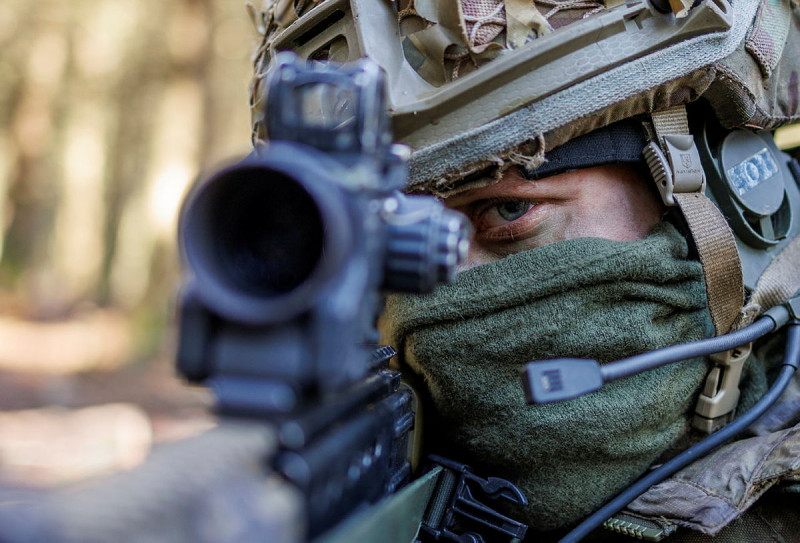24 June 2022 | Justice and home affairs
Is it time to halt the decline of the UK Armed Forces?

The nation will celebrate Armed Forces Day on 25 June 2022.
Armed Forces Day is an opportunity for the public to show its support for the men and women who make up the Armed Forces community: from currently serving troops, to Service families, veterans, and cadets.
The UK Armed Forces defends the UK and its interests. Around the world they, promote security and stability, deliver aid, tackle drug smugglers, and fight terrorism. At home, they have a vital role defending our borders and supporting civil responses to natural disasters and emergencies.
The war in Ukraine has highlighted the importance of the UK maintaining a strong military, capable of responding to a broad range of security challenges.
Yet, ever since 1945, the size of the UK Armed Forces has been in almost constant decline, with the noticeable exception of a spike during the early 1950s due to the Korean War. The UK now has just 148,000 personnel across the British Army, the Royal Navy, the Royal Air Force, and the Royal Marines.
“There is a burning imperative to forge an Army capable of fighting alongside our allies and defeating Russia in battle,” declared the British Army’s new Chief of the General Staff, General Sir Patrick Sanders last week.
“We are the generation that must prepare the Army to fight in Europe once again,” he added.
General Sanders is the first Chief of the General Staff since 1941 to take command of the Army in the shadow of a land war in Europe involving a continental power.
His comments do not bode well for a UK military at its smallest size for 300 years and which has re-postured over the last two decades to fight counter-insurgency operations, at the expense of conventional wars. Given soaring inflation, fiscal tightening and an economy heading for a recession, the Treasury will not look favourably on requests to increase Defence spending.
But, as General Sanders has said, “Russia’s invasion of Ukraine underlines [the UK Armed Forces’] core purpose – to protect the UK by being ready to fight and win wars on land.”
Military strength is not all about troop numbers, it’s about the mix of capabilities within the armed forces, their equipment, training levels, logistics capacity, and much more.
Nonetheless, the ever-present question remains: How small can the UK Armed Forces get, while maintaining the ability to ‘pack a punch’ at the right time and in the right place?
And, in difficult economic times, is the UK Government willing, or capable, to spend more on the UK Armed Forces to halt their decline?
*****
The Institute of Government & Public Policy is proud to support the Armed Forces Community.
We are a signatory to the Armed Forces Covenant which is a promise by the nation to ensure that those who serve or who have served in the armed forces, and their families, are treated fairly.
We recognise the value serving personnel, reservists, veterans, and military families bring to the government and public policy arena, and to our own business.
We employ several Army Reservists, veterans, and many of our staff have close relatives or dependants within the Armed Forces community.
We are especially proud to have been recognised for our support to the Armed Forces community by the Ministry of Defence, which has awarded us Bronze and Silver Awards for their Employer Recognition Scheme.
"The Ministry of Defence publicly recognises the commitment and support that companies such as yours are demonstrating, through being a supportive employer and acting as advocates for the people in the Armed Forces."
Image credit: Crown Copyright (OGL).

Events

The Future of UK Immigration 2026
26 February 2026

The National Operating Theatres Show 2026
10 March 2026

The Annual Facilities Management in the Public Sector Show 2026
17 March 2026

The Future of Academies Show and Exhibition 2026
25 March 2026

The Annual Special Educational Needs and Disabilities (SEND) Conference 2026
25 March 2026
Courses

Leaders in Construction Programme - CMI Level 7
24 February 2026
6 spaces available

AI for Leaders
24 February 2026
7 spaces available

Women In Leadership
6 March 2026
-4 spaces available

Construction Leadership and Management Development Programme - CMI Level 5
10 March 2026
4 spaces available

Effective Leadership Through Emotional Intelligence - CMI Level 7 Award
17 March 2026
5 spaces available